Meet the Alumni
Many of our MEG graduates have embarked on exciting career paths all around the world. Others have taken the opportunity to engage in further studies or have taken up other interesting opportunities. Click on the links below to see a selection of MEG alumni/ae profiles and find out what our former MEGs are up to now, and how the MEG program helped them to get there.
Haendel Sebastian Rodriguez, Colombia - graduated 2019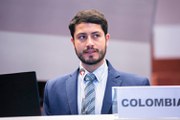
I’m a career diplomat and my personal interest in environmental issues led me to be part of the coordination for environmental issues at the Ministry of Foreign Affairs of Colombia, where I took part in several international negotiations. Although this working experience was very satisfying, I was lacking a stronger foundation on environmental issues, especially regarding the participation of different stakeholders in such international processes. That was the main reason why I decided to apply for MEG. My experience during the program exceeded by far my most optimistic expectations.
The multidisciplinary and comprehensive approach of MEG allowed me not only to gain new practical knowledge for improving my work performance but also to explore totally different perspectives on how environmental problems are perceived and how innovative solution can be developed worldwide. A fundamental element that made this possible was, without a doubt, the opportunity of meeting and discussing with people from all the world, specially from the Global South. The program was a unique opportunity for understanding how to build effective partnerships between people from different academic backgrounds and cultures.
Sarah Akwei-Marfo, Ghana - graduated 2018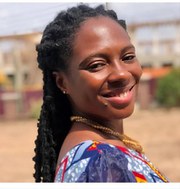
Being part of the MEG programme under the DAAD scholarship was a life changing experience for me. Before MEG I worked in with an Oil Marketing Company, station in a rural area in Ghana. My life there brought me to the harsh reality of youth unemployment, particularly in rural areas and its effects on the quality of life of young men and women. I could only dream of getting the opportunity to make impact in the lives of unemployed young people particularly in Ghana, but studying MEG and being part of the DAAD family made my dream come true. I did not only gain knowledge and academic excellence but also networking, and opportunities for my voice and work to actually make impact. MEG sharpened my teamwork skills. Talk about building confidence for public speaking, innovation and creativity and MEG is number 1. These are but a few of the things I loved about the programme.
Huyen Nga Le, Vietnam - graduated 2017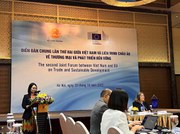
I am a MEG11 graduate from Vietnam with a Bachelor’s Degree in Business Administration. Before joining MEG, I used to work for a few years as a coordinator of environmental and climate change projects financed by a Korean development bank. During MEG, I had the chance to do internships in Madagascar and Jordan, getting engaged with a variety of projects and stakeholders. Both of the trips were funded, thanks to EPOS’s policy and MEG’s networks.
I was fortunate to get a six-month scholarship for an internship through the Carlo Schmid Program and the opportunity to intern at UNESCO Office in Jakarta, Indonesia.
Millicent Omala, Kenya - graduated 2016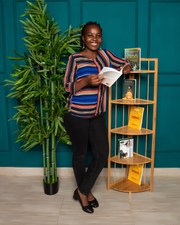
Having been born and raised in Kenya, my worldview before joining the MEG programme was mainly Kenya-centred. I had gone through the Kenyan education system and graduated from the University with a Bachelor’s Degree in Environmental Studies and Community Development and secured a job in Kenya. It had never occurred to me that I could live and work outside Kenya. After about three years of working, I began to have a strong feeling for a change but I wasn’t quite sure whether the change I needed was in a new a job or further studies. When I consulted my former lecturer, he advised me to apply for a scholarship and further my Studies. I did my internet search and came across the MEG Programme, just in time when applications were being accepted! I applied, was shortlisted, interviewed and accepted into the MEG programme. What was fascinating for me during that whole process was the efficiency and the responsiveness by the MEG and the DAAD teams. I got all the information I needed ahead of time and whenever I needed assistance or any form of clarification, it was provided. This gave me a great sense of assurance of the support I would receive during my stay in Germany. Even though it was going to be my first time leaving my home country, my mind was settled.
Catherine Irura, Kenya - graduated 2015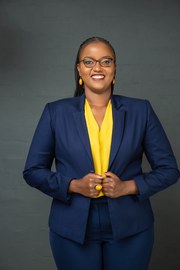
My name is Catherine Irura and I am a MEG 9 alumni. I was a recipient of the DAAD scholarship for students pursuing postgraduate courses of relevance to developing countries. I joined MEG in 2013, as a Bachelor of Law graduate admitted to the bar in Kenya, with internship experiences in human rights and environmental law.
MEG has had a tremendous impact in my career and the skills and exposure from MEG have been very relevant to my day-to-day work and sector-level responsibilities. The multi-disciplinary nature of MEG, which is one of its key strengths, has given me leverage in my career. There is a certain versatility and skill set that equips students for problem-solving at different levels, that are good for project management. Employers are keen on hiring staff with multiple skill sets, and MEG has a good balance of both technical skills and soft skills, and the benefit of learning in a multi-cultural environment.
The interest and enthusiasm of our professors in our learning journey was apparent and it had an impact in how we showed up in class. I felt like my professors were passionate about their work and teaching us, and at a personal level I felt like they were invested in my success and personal growth.
Nisa Butt, Pakistan - graduated 2014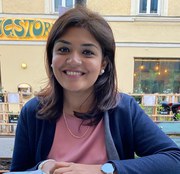
I was a MEG 8, a DAAD scholar, the first Pakistani to join this program. Before joining MEG on full scholarship, I worked at the Environmental Ministry in Pakistan, where my role was related to Training and Monitoring in Waste Management. Coming from a country where many girls do not get the opportunity to study and work internationally, it was indeed a privilege to collaborate and interact with students from diverse nationalities and backgrounds. I found MEG to be a very well-structured international program, which helped me learn and grow tremendously every single day. I still cherish the countless inspiring discussions and debates that we used to have within and outside the classroom environment, where one would listen and understand the viewpoint of students from around the world. It was only through this experience, that I could fully grasp and appreciate the magnitude and breadth of the topic of environment, and how it is interlinked with other Political and Socio-economic questions.
Achuu Simon Peter, Uganda - graduated 2014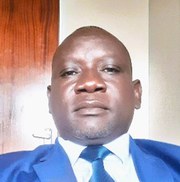
My name is Achuu Simon Peter, I come from Uganda a country endowed with unique and varying natural resources including interesting biological characteristics, vibrant socio-cultural features, and generally welcoming people. I am a beneficiary of MEG8 (2012 - 2014), under the DAAD programme for developing countries.
First, I would like to appreciate and value the support accorded to me by government of Germany through DAAD funding. This special support facilitated my two years of study at Freiburg. Although life was quite stressful and challenging at the beginning, the programme enabled me to achieve my dreams. I must also say life at Freiburg was very interesting and comfortable. My sincere gratitude also goes to the administration of Albert Ludwig’s University Freiburg for establishing and supporting an international academic programme that considers scholars from developing countries who may be talented but with limited financial capacities.
Rodrigo Cassola, Brazil - graduated 2011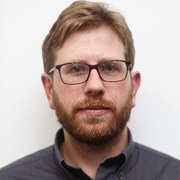
I joined MEG back in 2009, as part of its 5th cohort (MEG5). At the time, I was a young environmentalist with the Brazilian environmental agency (IBAMA). Having joined the agency straight out of the university and after 5 years of facing the challenges of environmental policy implementation in a developing country, I felt something was missing. With a background in natural sciences, there was clearly a gap in my understanding of the social and economic dimensions of environmental issues. Enrolling in a postgraduate program was a way route to deal with this limitation. More traditional, single-discipline, postgraduate courses, the kind available in Brazil at the time, had little appeal to me and would not close my knowledge gap.
This motivated me to search for opportunities elsewhere. In my case, Germany was an obvious place to start. I had a very positive experience with DAAD during my undergraduate studies (Hochschulwinterkurs, in 2002). It was through DAAD that I learned about MEG and, also, that it was part of a scholarship program for young professionals from developing countries, which was my case. MEG’s curriculum sounded exactly what I was looking for.
Read more.....
Catherine Njeri, Kenya - graduated 2010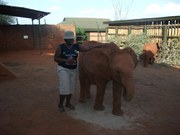
What are you doing now and where?
I am currently a programme consultant for a programme called Climate Change, Agriculture and Food Security (CCAFS) which is a programme of the Consultative Group on International Agricultural Research (CGIAR) and Earth System Science Partnership (ESSP). I am based in the East Africa office located in Nairobi, Kenya. For more information about the programme see http://www.ccafs.cigar.org
How did the MEG programme help you get to where you are now?
The experience i gained during the MEG programme gave me the confidence to interact with people from all over the world. As a result, my world view has broadened beyond Kenya! Which has proven to be quite useful since I currently work within an international context. Most importantly, my research topic on gender and climate change has created great avenues for me to not only present my work, but also to network and consequently build a database of contacts in the field of climate change and also gender. My interest in gender issues developed after I participated in an online course on "Gender roles in environmental management" which was offered by the MEG programme. As a result of this, I undertook my internship with Gendercc - Women for Climate Justice based in Berlin (http://www.gendercc.net/). While working with Gendercc, I got the opportunity to attend the landmark 15th conference of Parties (COP15) meeting in Copenhagen in 2009 where I participated in advocating for the inclusion of gender into the United Nations Framework Convention on Climate Change UNFCCC) processes. At the moment, I made it a point to ensure that gender issues are integrated into discussions on climate change, agriculture and food security.
What else keeps you busy these days?
Like my profile picture shows, I love elephants! During my free time I love visiting national parks and game reserves, and contributing to wildlife protection activities such as de-snaring and clean up activities.
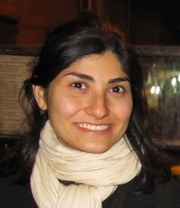 Romy Sato, Brazil - graduated 2010
Romy Sato, Brazil - graduated 2010
What are you doing now and where?
At an internship at FAO (Rome) with the Office of Knowledge Exchange, Research and Extension. Specifically, I work with a knowledge sharing platform called TECA - Technologies and good practices for small producers (www.fao.org/teca).
How did the MEG programme help you get to where you are now?
My current position actually arose out of an opportunity which was provided to DAAD Scholarship holders, so the MEG programme played an indirect role in that. My work requires knowledge about communication strategies and information and communication technologies (ICTs) as well as some knowledge about rural actors in development countries and their agricultural practices. The Student Organised Event of my MEG generation helped me to further develop my skills in managing ICT tools and critically thinking about how and why to use these tools for environmental governance, which can also be interrelated with rural development strategies.
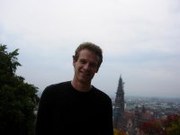 Thomas, Switzerland - graduated 2010
Thomas, Switzerland - graduated 2010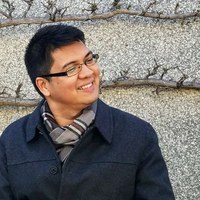
Andrew Zubiri, Philippines - graduated 2009
Doing the MSc in Environmental Governance (MEG) Program with a DAAD scholarship was a great privilege. I was one of the MEG Program's first recipients of a DAAD scholarship for postgraduate studies with relevance to developing countries. Without the scholarship, I would not have been able to pursue my graduate studies. It has been a few years since my graduation, and I can say MEG is a rigorous program that prepared me for further academic and professional pursuits.
After finishing my studies, I initially conducted academic research on climate change. It was difficult to leave it behind, but I had to follow my passion to work on something related to communications, which is what I have always wanted to do. The perfect opportunity came up when I got accepted as a World Bank Junior Profession Associate, where I was stationed at the Global Environmental Facility (GEF) Independent Evaluation Office in Washington, DC. There I managed an online community of practice for evaluators working on climate change and development. Also, during this time, three other MEG alumni became my colleagues, two of whom were also DAAD scholars. Not bad for such a small and relatively new program! It is especially fun and fulfilling to encounter other MEG alumni all over the world, and learn about the exciting work they are doing now, like when I attended the UNFCCC CoP15 in Copenhagen and CoP17 in Durban.
Upon my return to my home country in late 2013, I worked as the National Monitoring and Evaluation Officer at the UN FAO Philippine Country Office for the typhoon Haiyan disaster recovery and rehabilitation program, and later at the Asian Development Bank on knowledge management, communications, and research in the social development sector. Since 2016, I've been back at the World Bank in Washington, DC, where I have taken on various roles on evaluation, project portfolio analysis, and review of climate change considerations in strategic country documents.
Foto from twitter
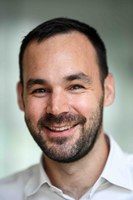 Rob Elsworth, United Kingdom - graduated 2008
Rob Elsworth, United Kingdom - graduated 2008
I live in Khartoum, the capital of Sudan, where I work for UN Environment. The project I work on supports the government of Sudanese to increase understanding and integration of climate resilience and environmental management into national and state level plans and policies. It focuses on climate change, integrated watershed management, natural resource management and mainstreaming environmental considerations and best practices into humanitarian programming.
Studying Environmental Governance at the University of Freiburg gave me the foundations of knowledge I apply in my job daily. The degree program was very well structured and international. Studying and working with students from around the world inspired critical thinking, dialogue and debate. This combination gave me a certain self-confidence because it made me feel well prepared for different fields of work.
Foto by Patrick Seeger
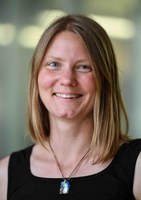 Irene Papst, Austria - graduated 2008
Irene Papst, Austria - graduated 2008
I work for a consulting firm that specializes in protecting the ozone layer and the climate more broadly. In my job, I provide policy consultation for the European Commission as well as individual countries like Turkey. In particular, my research evaluates the use of fluorinated greenhouse gases (F-gases). These can be used as substitutes for the substances which destroy the ozone layer-- thereby replacing damaging refrigerants with alternatives that are better for the climate.
The MEG program broadened my horizons. Before my master’s, I studied geosciences but wanted to do something to improve the world's environment. The program helped me to combine these two passions. The opportunity to connect with people from all over the world also makes this program very special. You get to know and understand different mentalities, different working approaches, or different ways of dealing with time pressure. These experiences I shared with my MEG fellows help inform my approach in my professional life every day.
Foto by Patrick Seeger
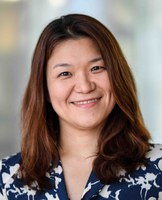 Sunae Kim, South Korea - graduated 2008
Sunae Kim, South Korea - graduated 2008
I began working for the United Nations Office for Project Services (UNOPS) in Bangkok, the capitol of Thailand, this year. I work in my field of food and agriculture in a program that deals with trade issues. Fourteen countries participate in this program, and as portfolio manager, I monitor how the projects are being implemented in each country to see what could be improved.
The MEG program provided me with the perfect training, because today I manage different projects for which I feel confident to deal with broad scopes and diverse issues in different technical areas. I liked the way the teaching was done here in Freiburg. In Germany, you can have more freedom and flexibility during your studies. This means you have to be more proactive to approach professors and discuss your ideas, but I enjoyed it very much.
Foto by Patrick Seeger
Flávia Gabriela Oyo Franca, Brazil - graduated 2008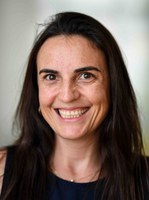
After graduation, I worked as a climate and forest researcher in an independent NGO and than I joined the private sector in a International Engineering & Construction company with a strong sustainability culture and policy. For the past 9 years I have collaborated in infrastructure projects based in Africa, enhancing the importance of sustainable regional development, civil society participation, environmental conservation and compliance with law and transparency. I also worked on a refinery project where I was responsible for reviewing whether environmental regulations were being followed and whether all necessary permits had been acquired. I recently have a role is to ensure good governance and compliance with company standards, implement the policy and procedures in cross cutting areas, especially in the delegated region Regional Compliance Coordinator for Europe, Middle East and Africa, and also coordinates the communication and training program focused on Compliance.
The MEG program gave me excellent preparation. In addition to getting to know many people from different cultures, I liked that there were never formal solutions for problems. We researched and worked out everything ourselves, just like in real life. No one just gives you the right answer, and there’s also never just one solution that always fits everything.
Foto by Patrick Seeger


